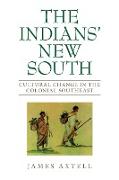Indians' New South
BücherAngebote / Angebote:
In this concise but sweeping study, James Axtell depicts the complete range of transformations in southeastern Indian cultures as a result of contact, and often conflict, with European explorers and settlers in the sixteenth, seventeenth, and eighteenth centuries. Stressing the dynamism and constant change in native cultures while showing no loss of Indian identity, Axtell effectively argues that the colonial Southeast cannot be fully understood without paying particular attention to its native inhabitants before their large-scale removal in the 1830s. Axtell begins by treating the irruption in native life of several Spanish entradas in the sixteenth century, most notably and destructively Hernando de Soto's, and the rapid decline of the great Mississippian societies in their wake. He then relates the rise and fall of the Franciscan missions in Florida to the aggressive advent of English settlement in Virginia and the Carolinas in the seventeenth century. Finally, he traces the largely symbiotic relations among the South Carolina English, the Louisiana French, and their native trading partners in the eighteenth-century deerskin business, and the growing dependence of the Indians on their white neighbors for necessities as well as conveniences and luxuries. Focusing on the primary context of interaction between natives and newcomers in each century - warfare, missions, and trade - and drawing upon a wide range of ethnohistorical sources, including written, oral, archaeological, linguistic, and artistic ones, Axtell gives a rich sense of the variety and complexity of Indian-white interactions and a clear interpretative matrix by which to assimilate the details.
Folgt in ca. 10 Arbeitstagen




